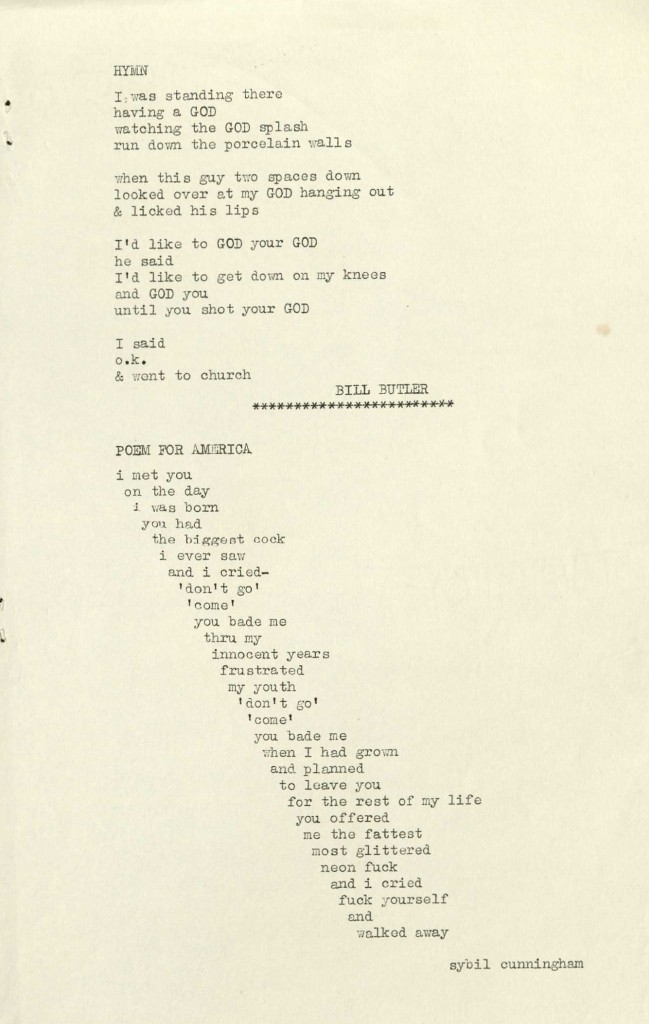Read Attila
Bill Butler is the writer, editor, printer and distributor behind Attila. In one issue he signed off as Attila the Honey which is how I think of him.
He moved to conservative 1960s Brighton from California’s West Coast as a young man, and he brought a bit of the Height-Ashbury hippie haven to this Victorian Riviera.
Butler opened Unicorn Bookshop at 50 Glouster Road and ran THE unofficial community service alongside his licensed bookshop for its six years of operation. Budding hippies, freaks, radicals and left-y youth in Brighton sought out Bill and Unicorn staff to talk literature, politics, sexuality (Butler was openly gay), parties, the psychoactive and esoteric and much more. His presence here changed the political map of Brighton by nurturing a progressive population, one which persists until today as a counterpoint in an otherwise perpetually conservative South Coast.
He was easy to find in print or in person. Generous, he shared his writing and his time freely and published in several local papers. This page of his poetry is taken from Head and Freak Magazine circa early 70s
Attila, Unicorn’s weekly mimeo community paper, published the writing, illustrations and organsing efforts of Brighton’s alternative movement. Butler produced and wrote the first 21 issues. Calls for group members, revelers, road trips or alternative services are in every issue.
The June 12th 1971 issue Attila lists:
- a pre-festival frolic at Churchill Square
- a Freer Streets carnival for quiet streets [without car traffic noise]
- a Revolutionary Festival at the University of Sussex
- contact information for the allotments officer along with advice to invoke Pan, Silvanus, Ceres, and The White Goddess for your patch of veg
- times for the prohibited student radio show Radio Albatross
- hours for a new vegetarian restaurant Open Sect on 7 Victoria Road
- times for Sussex Festival and Worthing Festival
- Gonczar’s home address for those interested in joining UFO-watchers club.
Butler was a coordinating force for the alternative people of Brighton. Deeply moral, he cherished civil liberties. From the first issue of Attila he speaks on behalf of their protection. Furious about the obscenity charges levied against the countercultural paper OZ, he argued that the moral politics of British institutions were corrupted and not, as they claimed, the morals of the alternative communities.
“One good liberal witness has refused to testify on the grounds that he personally finds the material (Skoolkids OZ) “DISGUSTING”. Which wasn’t the point. The law doesn’t say anything at all about what makes you sick to your stomach — like the Archbishop of Canterbury makes me sick to my stomach. That, alone, doesn’t make him obscene.”
Martin Luther King famously said “The ultimate measure of a man is not where he stands in moments of comfort and convenience, but where he stands in times of challenge and controversy.” Brighton had Butler to grow its good witnesses. Butler’s need for people to argue against arbitrary censorship came from hard lived experience. Unicorn Bookshop was raided by the police in January of 1968; Butler was prosecuted and fined for selling copies of Evergreen Review and J.G. Ballard’s Why I Want to Fuck Ronald Regan.
Like anyone who wants to nurture people into taking responsibility for fellow human beings, Butler prompted people to live according to their morals. John Spiers excellent bibliography of underground press quotes Butler challenging his peers.
‘What alternative? Where is the much talked about “community”? Is the community your clique or ours? Was there any action last summer/were there any actual alternatives which weren’t purely for the coffee-table freaks?
‘If you’re quick to blame the “average freak in the street”, a safe well-used assumption, bear in mind that the real apathy has its source not in the streets but in the … half-a-dozen so-called “community shops”, none of which provide an alternative service. . .
…’Nobody has ever touched the problems of finding different ways of working in this town…There are no alternative means of earning enough to live on, or of finding different means of shelter.
…Admit that at the present level of activity the very word community does not help, except to stoned dreams and coffee-table, rush mat gossip. Are you a psychic leach?
Today, in stark contrast to the hippie/freak/alternative/radical messages of self-determined futures of irreverent joy, there’s a conservative stronghold which dominates in our public discourse. Trump, Brexit, and the massive killing off of public services under the Cameron cum May government are examples of how a conservative worldview can successfully fabricate an elaborate system of moral justifications for unpopular, possibly even cruel, policy choices. Incidentally, when Regan ran for presidency in 1980, Why I Want to Fuck Ronald Regan was mockingly circulated at the Republican Party Convention.
It’s Regan’s presidency that marks the beginning of a conservative worldview that would spread through political, media, academic and religious institutions. Reading Butler we can ground ourselves in a history of Brighton’s grassroots progressive instincts, and a discourse to inspire us to coordinate our efforts to lead public opinions (as progressives did in the 60s and 70s) rather than follow them.

